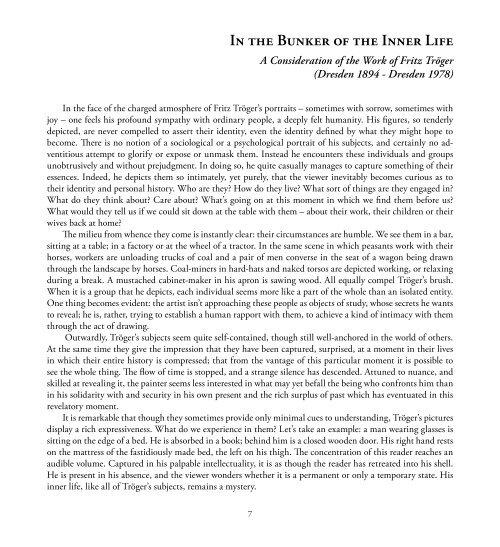Fritz Tröger - Pierre Menard Gallery
Fritz Tröger - Pierre Menard Gallery
Fritz Tröger - Pierre Menard Gallery
Create successful ePaper yourself
Turn your PDF publications into a flip-book with our unique Google optimized e-Paper software.
In the Bunker of the Inner Life<br />
In the face of the charged atmosphere of <strong>Fritz</strong> <strong>Tröger</strong>’s portraits – sometimes with sorrow, sometimes with<br />
joy – one feels his profound sympathy with ordinary people, a deeply felt humanity. His figures, so tenderly<br />
depicted, are never compelled to assert their identity, even the identity defined by what they might hope to<br />
become. There is no notion of a sociological or a psychological portrait of his subjects, and certainly no adventitious<br />
attempt to glorify or expose or unmask them. Instead he encounters these individuals and groups<br />
unobtrusively and without prejudgment. In doing so, he quite casually manages to capture something of their<br />
essences. Indeed, he depicts them so intimately, yet purely, that the viewer inevitably becomes curious as to<br />
their identity and personal history. Who are they? How do they live? What sort of things are they engaged in?<br />
What do they think about? Care about? What’s going on at this moment in which we find them before us?<br />
What would they tell us if we could sit down at the table with them – about their work, their children or their<br />
wives back at home?<br />
The milieu from whence they come is instantly clear: their circumstances are humble. We see them in a bar,<br />
sitting at a table; in a factory or at the wheel of a tractor. In the same scene in which peasants work with their<br />
horses, workers are unloading trucks of coal and a pair of men converse in the seat of a wagon being drawn<br />
through the landscape by horses. Coal-miners in hard-hats and naked torsos are depicted working, or relaxing<br />
during a break. A mustached cabinet-maker in his apron is sawing wood. All equally compel <strong>Tröger</strong>’s brush.<br />
When it is a group that he depicts, each individual seems more like a part of the whole than an isolated entity.<br />
One thing becomes evident: the artist isn’t approaching these people as objects of study, whose secrets he wants<br />
to reveal; he is, rather, trying to establish a human rapport with them, to achieve a kind of intimacy with them<br />
through the act of drawing.<br />
Outwardly, <strong>Tröger</strong>’s subjects seem quite self-contained, though still well-anchored in the world of others.<br />
At the same time they give the impression that they have been captured, surprised, at a moment in their lives<br />
in which their entire history is compressed; that from the vantage of this particular moment it is possible to<br />
see the whole thing. The flow of time is stopped, and a strange silence has descended. Attuned to nuance, and<br />
skilled at revealing it, the painter seems less interested in what may yet befall the being who confronts him than<br />
in his solidarity with and security in his own present and the rich surplus of past which has eventuated in this<br />
revelatory moment.<br />
It is remarkable that though they sometimes provide only minimal cues to understanding, <strong>Tröger</strong>’s pictures<br />
display a rich expressiveness. What do we experience in them? Let’s take an example: a man wearing glasses is<br />
sitting on the edge of a bed. He is absorbed in a book; behind him is a closed wooden door. His right hand rests<br />
on the mattress of the fastidiously made bed, the left on his thigh. The concentration of this reader reaches an<br />
audible volume. Captured in his palpable intellectuality, it is as though the reader has retreated into his shell.<br />
He is present in his absence, and the viewer wonders whether it is a permanent or only a temporary state. His<br />
inner life, like all of <strong>Tröger</strong>’s subjects, remains a mystery.<br />
7<br />
A Consideration of the Work of <strong>Fritz</strong> <strong>Tröger</strong><br />
(Dresden 1894 - Dresden 1978)


